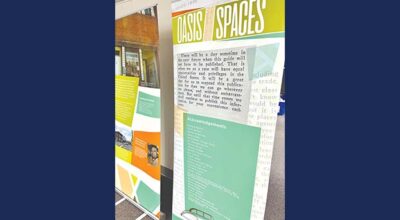Partnership for the Sounds worried about funding
Published 12:45 am Sunday, March 31, 2013

The Partnership for the Sounds operates the restored Columbia Theater Cultural Resources Center in Columbia in addition to other facilities such as the N.C. Estuarium in Washington. PARTNERSHIP FOR THE SOUNDS | CONTRIBUTED
With Gov. Pat McCrory’s proposed budget cutting funding for many nonprofit organizations in North Carolina, the Partnership for the Sounds could use some friends in the N.C. General Assembly.
The nonprofit, which operates the N.C. Estuarium and other facilities in four counties, may have at least two friends in the Legislature, one in each house. Two-thirds of the Partnership for the Sounds annual budget comes from the state, passing through the N.C. Department of Commerce before it trickles down to the nonprofit.
Tom Richter, a Partnership for the Sounds board member, worries about what the Legislature could do to the nonprofit’s allocation from the state.
“The state appropriation is important to us. The Legislature’s in the budget business now. We’re busier or as busy as we’ve ever been. When I stopped in to the Estuarium (on Tuesday)… it was just jam-packed, full of kids,” Richter said.
Richter said that presence underscores a mission of the Estuarium and other Partnership for the Sounds facilities: to educate children about what’s in the area’s environment and the importance of protecting that environment.
“In terms of lean and mean, we can’t get much leaner,” he said.
In recent years, the nonprofit has seen its annual allocation decrease from about $500,000 to $300,000. A continuing reduction in state funds would put Partnership for the Sounds in a fiscal bind, forcing it to seek funding from other sources, said Jackie Peoples Woolard, the nonprofit’s executive director.
Since 2009, funding from the state has decreased by an accumulated 23 percent, Woolard said.
The nonprofit is lobbying as many legislators as possible to win their support for the state to continue to provide it with funds, Richter noted.
State Sen. Bill Cook, a Beaufort County resident, said it’s premature to speculate on what could happen to funding for nonprofits, adding that it’s the Legislature that has the final word on how much funding the nonprofits will be allocated.
“The governor’s budget is a starting point. We’ll be making some changes to it,” Cook said. “I’ll try to help them (Partnership for the Sounds) as best I can.”
Asked if he’s supporting the nonprofit’s effort to keep at least some of its state funding, Cook said, “Certainly.”
Cook said the Estuarium and other Partnership for the Sounds’ facilities play important roles in educating people about eastern North Carolina’s environment and culture.
“Let me put it this way, when someone comes to visit me, the first place I take them is the Estuarium, particularly if they have children. It’s educational; it’s entertaining. It’s an attraction for Washington,” Cook said.
Another legislator has similar views.
“I can’t really talk to (reduced or eliminated funding) until the budget comes out. They’ve been pretty tight-lipped on that,” state Rep. Paul Tine said. “That’ll be the indicator at that time.”
Until he sees what the Legislature does with the governor’s budget proposal, Tine said, he couldn’t really gauge what it will do with funding for nonprofits.
“In broad terms, I can say I support the funding to it. Cultural resources are important parts of eco-development. Those types of programs they have … help drive that tourism economy and help educate the public on the importance of our natural environment, which we depend on for our economy in large part of this region. I’m supportive of their work,” Tine said.
Woolard had a similar concern about funding two years ago when Marc Basnight, president pro tempore of the state Senate and a champion of the nonprofit, retired. Woolard is more concerned this year than she was two years ago.
Woolard said the nonprofit has a plan in case state funds for the nonprofit are decreased or eliminated.
“Well, obviously, we’re going to try to raise the money elsewhere. Because we’ve had state funding, it makes receive large amounts of money from other sources — grants or individuals’ money — a little more difficult because people get into that mode of knowing that you have state funding. Even well-intentioned people will think, ‘Well, we can give this to someone else who needs it more.’ That has been a little bit of the case with us that we were fortunate to be funded so well,” Woolard said.
The nonprofit has had some financial security over the years because of money allocated to it by local governments in the four counties — Beaufort, Hyde, Bertie and Tyrrell — in which it has a presence, Woolard said.
“What we would have to do, if the worst-case scenario happened, is to make a very concerted, deliberate effort to go after foundation funding and private money,” Woolard said.
That route might not be easy, said Tom Stroud, deputy director of programs for Partnership for the Sounds.
“It’s also tough to make that transition quickly. Generating private support is a little more of a long-term proposition. So, the transition could very difficult,” Stroud said.






